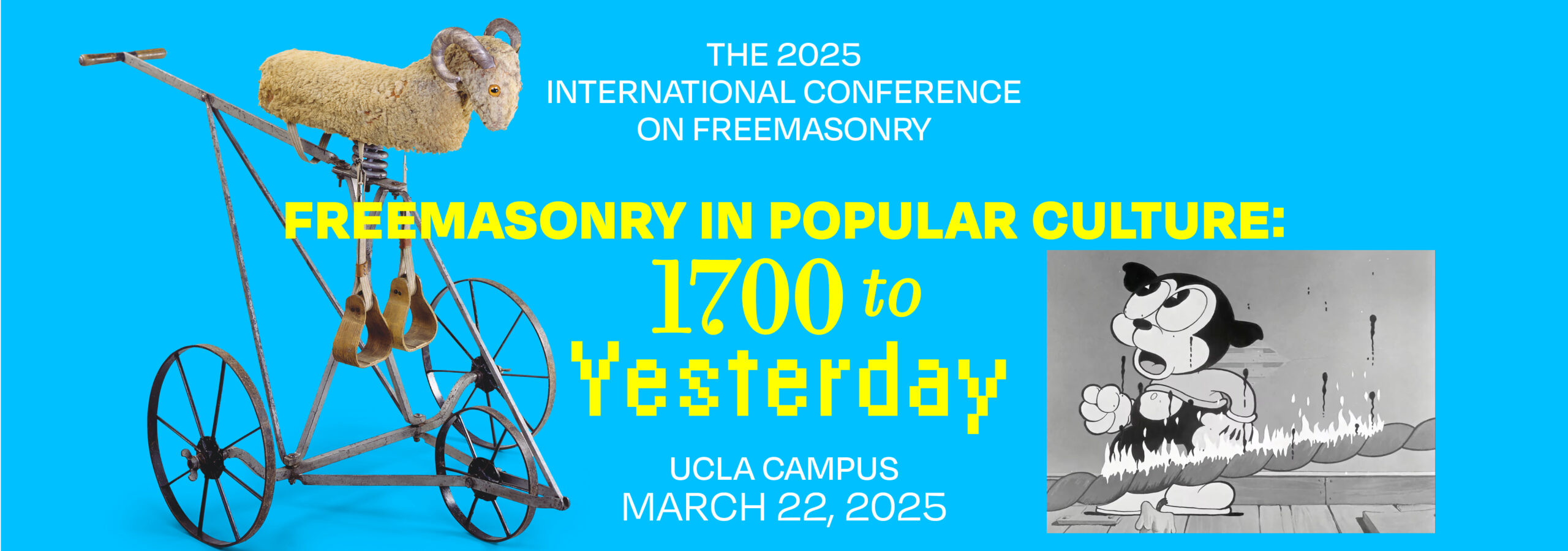
2025 International Conference on Freemasonry:
"Freemasonry in Popular Culture: 1700 to Yesterday, Part 1"
Saturday, March 22 at the University of California, Los Angeles
Admission: $40; optional lunch $25
The 13th International Conference on Freemasonry is returning to the campus of the University of California in Los Angeles on March 22, 2025, with a focus on “Freemasonry in Popular Culture: 1700 to Yesterday, Part 1″.
When Dr. Susan Mitchell Sommers, Chair of the International Conference of Freemasonry, issued the call for proposals for this conference, she hoped scholars would creatively interpret the theme of “Freemasonry in Popular Culture: 1700 to Yesterday.” The response exceeded expectations, delivering diverse and engaging perspectives.
From its inception, Freemasonry has interwoven with popular culture—borrowing symbols, rituals, and myths while influencing countless other fraternal organizations. This cultural exchange, formalized during the rise of Grand Lodge Freemasonry in the 1720s, has shaped both masonic and non-masonic traditions, creating a fascinating tapestry of shared practices.
This year, we’re meeting in Los Angeles, the epicenter of American entertainment, to explore how Freemasonry intersects with the cultural zeitgeist. Presentations include analyses of historical catalogs that shaped fraternal regalia, insights into shared ritualistic practices, and even deep dives into iconic media like Bimbo’s Initiation (1931)—a surreal animated short laden with masonic and fraternal motifs once easily recognizable to its contemporary audience.
The conference promises to unravel how Freemasonry has shaped and been shaped by the ever-evolving landscape of popular culture. Join us as we delve into these dynamic intersections!
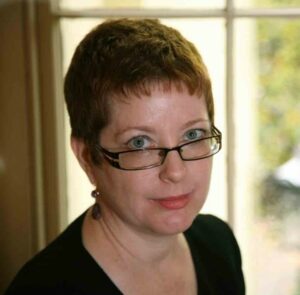
Dr. Susan Mitchell Sommers, Chair of the International Conference of Freemasonry
After earning a Ph.D in British history at Washington University, Susan Mitchell Sommers joined the faculty at Saint Vincent College in Latrobe, Penn., where she is a professor of history. Sommers has been a fellow of the Royal Historical Society since 2014 and has been involved in editing the Journal for Research into Freemasonry and Fraternalism as well as Zeitschrift für Internationale Freimaurer-Forschung.
Speakers
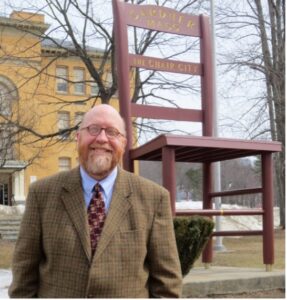 William D. Moore
William D. Moore
Holds a joint appointment in History of Art & Architecture and American & New England Studies “The Strange Case of the Mechanical Goat in the Fraternal Lodge”
Presentation Abstract: At the end of the 19th century, it was widely believed that fraternal initiates were blindfolded and made to ride goats. Initially promoted by critics of secret societies, this myth was embraced by fraternalists in the 1880s as a humorous tradition. By 1900, fraternal organizations like the Odd Fellows and Knights of Pythias introduced “side degrees,” where initiates faced boisterous, comedic ceremonies, often involving mechanical goats. These goats, produced by companies like De Moulin Brothers and Pettibone Brothers, became popular props. However, some initiates eventually sued lodges after being injured during these initiations, highlighting the dangers of these humorous rites
Speaker Bio: William D. Moore holds a joint appointment in History of Art & Architecture and American & New England Studies. His research focuses on material culture, vernacular architecture, folk art, and American fraternalism. He is the author of Shaker Fever and Masonic Temples, and is currently writing a book on Cape Cod’s architecture for the University of Virginia Press. He serves on the editorial boards of Winterthur Portfolio and Buildings & Landscapes.
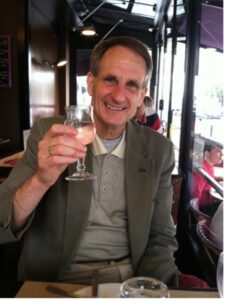
James Smith Allen
Emeritus Professor of History at Southern Illinois University Carbondale
“The Mysteries on Stage: Mozart’s Magic Flute in Vienna and Paris, But Also Hollywood, 1791–1984”
Presentation Abstract: Mozart’s The Magic Flute (Die Zauberflöte) is rich with Masonic themes, immediately recognizable to Viennese audiences in 1791. However, its journey to Paris transformed it into Les Mystères d’Isis (1801), a censored adaptation stripped of Masonic references to avoid offending Napoléon Bonaparte. This French version, a parody filled with vaudeville elements, altered Mozart’s music and intent, earning the nickname The Miseries of Isis. This presentation examines the missing Masonic elements from Les Mystères d’Isis, the historical and cultural forces shaping its adaptation, and its eventual faithful translation in 1873. The discussion extends to Peter Shaffer’s 1984 film Amadeus, analyzing its omission of Freemasonry and its broader implications for the portrayal of Mozart and his era. Drawing from German, French, and English sources, this study highlights how reinterpretations of The Magic Flute across time and media have reshaped its Masonic and cultural significance.
Speaker Bio: James Smith Allen, emeritus Professor of History at Southern Illinois University Carbondale, specializes in 19th-century French social and intellectual history. His work explores romanticism, reading, feminism, and memory, with notable publications including A Civil Society: The Public Space of Freemason Women in France, 1744–1944 (2021).

Martin Cherry
Librarian at the Museum of Freemasonry since 2002, oversees Britain’s premier masonic collection
“A Spotlight on English Theatrical Lodges in the Late 19th and Early 20th Century”
Presentation Abstract: During the Golden Age of Fraternalism (1870–1910), English Freemasonry experienced significant growth, including the rise of “class” lodges formed around shared professional or social interests. Theatrical lodges, established by actors and theatrical professionals, flourished during this time, with notable examples like Drury Lane Lodge and Chelsea Lodge serving London’s vibrant theatre community.
This presentation explores the creation, membership, and purpose of theatrical lodges, comparing their development to other professional lodges. It investigates their social acceptance within Freemasonry and their enduring legacy into the 20th century and beyond
Speaker bio: Martin Cherry, librarian at the Museum of Freemasonry since 2002, oversees Britain’s premier masonic collection. A leading expert in masonic libraries, he frequently speaks on Freemasonry and librarianship. His recent research on Anderson’s Book of Constitutions will appear in the Transactions of the Research Lodge of Leicester (2024).
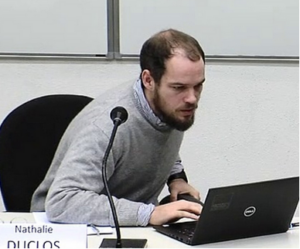
Simon Deschamps
Senior Lecturer at Université Toulouse
“The Burnes Brothers: Popularizing an Oriental Masonic Tradition”
Presentation Abstract: In 1834, Sir Alexander Burnes claimed to have discovered traces of Freemasonry in Asia, including Masonic symbols on Mughal emperor Humayun’s tomb. Later, his brother, James Burnes, linked Freemasonry to ancient Hindu and Egyptian mysteries. This paper explores their influential roles in promoting an “oriental” Masonic tradition, enhancing the Craft’s universal claims and fostering Indian integration.
Speaker bio: Simon Deschamps, Senior Lecturer at Université Toulouse – Jean Jaurès, researches cultural imperialism, globalization, and Freemasonry’s role in sociability and power. His works include Sociabilité maçonnique et pouvoir colonial dans l’Inde britannique, 1730-1921 (2019) and articles on Masonic networks in colonial India
 Dr. Jaclynne Kerner
Dr. Jaclynne Kerner
Associate Professor of Art History, State University of New York at New Paltz
“Orientalizing the American Popular Imagination: The Sights, Sounds, and Souvenirs of the 1922 Shriner Convention”
Presentation Abstract: This presentation explores the 1922 “Golden Jubilee” convention of the Shriners in San Francisco, marking the 50th anniversary of the Ancient Arabic Order of Nobles of the Mystic Shrine. The event featured elaborate activities like parades, concerts, and exotic-themed displays, transforming the city’s center into an “Oriental” spectacle with crescents, minarets, and camel statues. The convention also signaled a shift for the Shrine, which began to focus on philanthropy after Prohibition curbed its former reputation as a boozy social club. Through archival photos, souvenirs, and ephemera, the paper examines how Shrinedom’s material culture contributed to American popular culture’s Orientalized imagery. This paper is part of a broader project on Shriner material and visual culture during American fraternalism’s “Golden Age” (c. 1870–1930).d
Speaker bio: Dr. Jaclynne Kerner, a professor at SUNY New Paltz, specializes in Islamic art and architecture with minor fields in Arabic literature and Renaissance art. She teaches Islamic art, medieval Europe, and world art. Prior to SUNY, Dr. Kerner taught at Pepperdine, CSU Long Beach, and Fordham. Her current project is a two-volume study on the Shriners’ material legacy.

